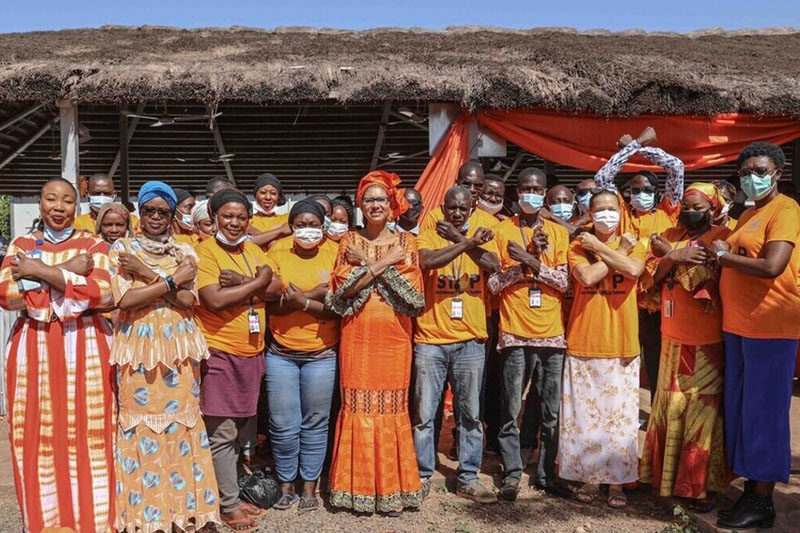Thirty members of Jire Dole – a network for mothers and wives of disappeared men, former detainees and survivors of abduction and gender-based violence (GBV) – have attended a two-day training workshop to help build their resilience, mental health and get much-needed psycho-social support.
The workshop was organised by the Allamin Foundation for Peace and Development, a local non-governmental organisation (NGO) based in Maiduguri. All those who attended the workshop were victims of the Jamā’at Ahl as-Sunnah lid-Da’way Wa’l-Jihād (JAS) insurgency and/or victims of gender-based (GBV).
The workshop included lectures on business activities and provided skills training so that the participants would have the means to become entrepreneurs. It was held at the foundation’s head office.
Participants, who said they were grateful for the chance to attend the workshop, shared touching stories about what had happened to them.
Falmata Bukar told RNI that she was abducted by JAS, better known as Boko Haram, insurgents when her hometown, Gajiganna in the Magumeri Local Government Area of Borno State, was attacked and people fled the town. While trying to flee, she was captured by insurgents and taken to their lair in the forest.
“I was in captivity for about one-and-a-half years. During my stay with the insurgents, I was forced to marry one of them and now I have a child.
“I managed to escape from the forest at night with my little daughter, without the insurgents seeing us, about three months ago. After I left the forest, I returned to Gajiganna, which was scary because that was where the insurgents had captured me. The residents shunned me and my daughter at first but gradually they have accepted us and now treat us with love and care. I think they realised the trauma I had gone through.”
Bukar said she was extremely happy to be among those chosen to attend the workshop. She said the skills she learnt during the training would help her to become self-reliant.
“I’m very grateful to the organisers. May God bless them.”
Mohammed Abba Zakariya Kumshe was kidnapped by insurgents and spent almost four years in the forest until he and his family – and about 20 others – found a way to leave.
“When I escaped from the forest, I first went to Dikwa town and from there I was taken to Giwa Barracks on the outskirts of Maiduguri. After that, I was taken to Gombe State where I spent about a year before I was taken to the Shokari rehabilitation camp. Then I was finally released and reunited with my family and reintegrated into the community.
“I was nervous at first but my family and the community accepted me with special love and care. I’m so happy and relieved about that. For the four years I was held by the insurgents I felt helpless and discouraged. I did not know if I would ever get out of the forest. I was terrified the insurgents would kill me. It felt as if my life had fallen apart.
“But the skills acquisition training will help me to become self-employed and self-reliant which means I will be able to take care of my family properly. So, I sincerely thank the foundation for its humanitarian support. I feel like a new person and I have hope again.”
Falmata Musa, a gender officer at the foundation, told RNI that the training was organised purposely to orientate, educate and enlighten the participants, providing useful information and knowledge and building resilience among victims of forced marriage and those who had been violated, many of them abused by the JAS as well as by solders and/or members of the civilian joint task force who often used religion to justify their actions.
“So far, we have trained 30 victims of insurgency and GBV. We intend to do more training with victims or survivors, as we prefer to call them,” she said.
Hajjja Ya Kime, a chief nursing officer and facilitator at the foundation, said: “One of the purposes of the training was to create awareness and provide psycho-social support to the victims of insurgency to help them forget or at least come to terms with the bad experiences they had endured in the past as a result of the conflict.
“We also encouraged participants to use the cash support given to them to begin business activities that would help them to become self-reliant so that they can take responsibility and take care of their families instead of begging in the streets.
“Also, the training was aimed at providing the participants – who were all victims of atrocities, although we prefer to call them survivors – with necessary information on mental health. After what they went through they urgently needed psycho-social support. The training helped to bring back their self-esteem and confidence and build their resilience. They were given skills training to enable them to become entrepreneurs, which also helped to build their confidence and self-esteem. It gave their lives meaning again.
“Abuses of all kinds can cause depression and make victims feel worthless. We try to change that and give them a reason to live; to make them feel whole again. We want them all to be survivors, not victims.”
SHETTIMA LAWAN MONGUNO






